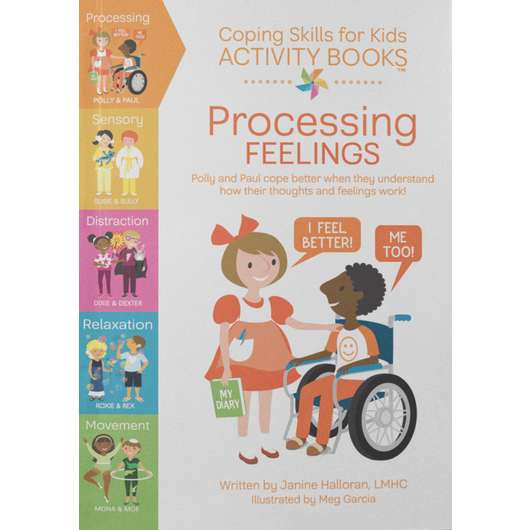






This book helps children explore a range of emotions with a variety of activities. The activities help kids identify what they are feeling, and recognize that they can intervene with a coping skill before their emotions become difficult to manage. This book, like All Coping Skills for Kids™ products is designed for ease of use by parents, caregivers and professionals alike.
The feelings included in this book are:
Here’s a brief description of the Included worksheets:
What makes you feel….
Sometimes it’s hard for kids to express themselves just by talking. This worksheet is an opportunity for kids to write or draw what makes them feel different emotions.
What makes other people feel…
Some kids struggle to identify their feelings. An easier way to start the conversation is to begin by asking about other people feelings instead.
Pick one color and draw about feeling...
Kids can express themselves by picking a color that connects to a feeling and then drawing about that feeling using the color.
Draw about feeling ___ using shapes.
Using shapes is another way for kids to share and express their feelings. For example, some kids may draw sad as raindrop shapes, or happy as hearts.
Draw or write coping skills you can use when you feel…
The goal of Coping Skills for Kids is to help children identify safe and healthy coping skills they can use when they are experiencing different emotions. This sheet helps kids start to make the connection between having a feeling and using an appropriate coping skill to express that feeling safely.
Feelings Thermometer
Being able to identify not only what you are feeling, but also how much you are feeling, is an essential piece to managing your emotions, thoughts, and behaviors. If you know when you are starting to have a more significant reaction, then you can intervene and use the right coping skill to help manage your feelings. The goal should be to have kids use a coping skill when they are lower on the thermometer before things escalate. The other benefit of the feelings thermometer is that it helps kids put feelings and coping skills together.
There are also some blank versions of the worksheets in the back where kids can fill in any feeling they want, as well as a worksheet to help kids share how they are feeling in the moment.
How are you feeling today? Write or draw about it.
At the end of the book, there are blank pages you can use to have kids share how they are feeling by writing or drawing about it. These sheets are a way to start a dialogue with kids about their feelings but using writing or drawing instead of talking out loud.
No customer reviews for the moment.